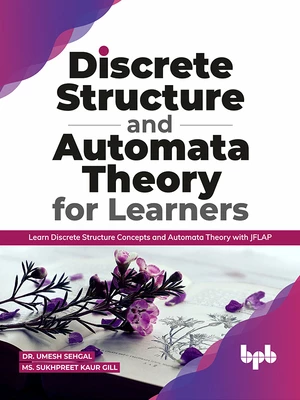Learn to identify the implementation of Discrete Structure and Theory of Automata in a myriad of applications used in day to day life Key Features; Learn how to write an argument using logical notation and decide if the argument is valid or not valid.; Learn how to use the concept of different data structures (stacks, queues, sorting concept, etc.) in the computer science field.; Learn how to use Automata Machines like FSM, Pushdown automata, Turing machine, etc. in various applications related to computer science through suitable practical illustration.; Learn how to implement the finite state machine using JFLAP (Java Formal Languages and Automata Package). Description This book's purpose is to provide a modern and comprehensive introduction to the subject of Discrete Structures and Automata Theory. Discrete structures, also called Discrete Mathematics, are an exciting and active subject, particularly due to its extreme relevance to both Mathematics and Computer Science and Algorithms. This subject forms a common foundation for rigorous Mathematical, Logical Reasoning and Proofs, as well as a formal introduction to abstract objects that are essential tools in an assortment of applications and effective computer implementations. Computing skills are now an integral part of almost all the Scientific fields, and students are very enthusiastic about being able to harness the full computing power of these tools. Further, this book also deep dives into the Automata Theory with various examples that illustrate the basic concepts and is substantiated with multiple diagrams. The book's vital feature is that it contains the practical implementation of the Automata Machine example through the JFLAP Tool. Courses on Discrete Structures and Automata theory are offered at most universities and colleges. What will you learn; Understand the basic concepts of Sets and operations in Sets.; Demonstrate different traversal techniques for Trees and Graphs.; Deep dive into the concept of Mathematical Induction, Sets, Relations, Functions, Recursion, Graphs, Trees, Boolean Algebra, and Proof techniques.; Understand the concept of Automata Machines in day to day life like the Elevator, Turnstile, Genetic Algorithms, Traffic lights, etc.; Use the JFLAP tool to solve the various exercise problems related to automata theory. Who this book is for This book is a must-read to everyone interested in improving their concepts regarding Discrete Structure and Automata Theory. Table of Contents 1. Set Theory 2. Relations and Functions 3. Graph Theory 4. Trees 5. Algebraic Structure 6. Recursion and Recurrence Relations 7. Sorting 8. Queues 9. Introduction 10. Finite Automata Theory 11. Theory of Machines 12. Regular Language 13. Grammar 14. Pushdown Automata 15. Cellular Automata 16. Turning Machine 17. Problems Solving Using JFLAP Tool 18. Revision Questions About The Authors Dr. UMESH SEHGAL completed his Ph.D.,M.Phil. Computer Science and MCA. He held academic positions at the GNA University as an A.P in FCS Department. He has achieved the Best Educationist Award in 2017.He has achieved the Indira Gandhi Education Excellence Award in 2017.He has achieved the Best Researcher Award in 2018-19. SUKHPREET KAUR GILL received the M.Tech. degree in Computer Science and Engineering from Guru Nanak Dev Engineering College, Ludhiana. She is currently working as Assistant Professor at GNA University Phagwara. She has achieved the Bright Educator Award 2019. She has published several articles in leading International and National Computer science journals.
Price history
Sep 14, 2022
€14.37

